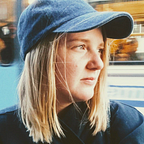AI ❤ Beauty?
As we live a large extent of our daily lives online, filters used for photos and videos are becoming more and more popular. And whilst Instagram camera filters have been around for long, the use of camera effects and face altering features are increasing considerably. Some are funny, giving you puppy ears, others are branded, some are geotagged, but the most common ones are beauty filters.
Beauty filters are essentially automated photo editing tools that use artificial intelligence and computer vision to detect facial features and change them. AI beauty filters can change the appearance of the person in the photo/video in order to make them more attractive. This often happens by recolouring and reshaping their features, all based on algorithms. Services such as Qoves Studio and Face Plus Plus offer facial assessment tools that run on neural networks that mimic the operations of the human brain while using sample data of people’s faces to make recommendations. The recommendations could be to change the way the makeup is done, in some other cases there is recommendations for a surgical intervention. But this trend is not only visible on social media, it can also be seen within video conferencing. Last year it was reported that Microsoft is working on a new feature for Teams that will allow users to subtly adjust lighting levels and smooth out facial features, before joining a video call.
But coupling AI and beauty is quite problematic. The pitfalls to AI-driven beauty scoring starts with the premise that while real-world beauty is in the eye of many different beholders with diverse viewpoints, app-scored beauty is subject to a single electronic gaze. One could also argue that since we have different cultural standards when it comes to beauty, is it even possible to train an algorithm to assess whether or not someone is beautiful? Beauty algorithms have also come under severe criticism for perpetuating racism and ageism. This is due to the fact that the algorithms usually train with Caucasian faces, which make them penalize everyone that doesn’t have a Caucasian face. This issue is further stressed by assistant professor Lauren Rhue at the University of Maryland’s Robert H. Smith School of Business. She points out that our choice of beauty filters definitely is informed by the culture, which in turn is dominated by Eurocentric beauty standards with the effect that beauty algorithms might exclude those from racial or ethnic minority populations.
Unfortunately research also shows that the usage of beauty filters influences the user’s understanding of their own appearance. Leaked documents from inside Facebook reveal that Instagram harms many of its users, and its parent company Facebook has known this for years. As one company slide concluded: “We make body image issues worse for one in three teen girls.” Simultaneously surgeons are reporting that patients now want to undergo procedures to look more like their digitally altered selves. To try to minimize the effects of filters lawmakers in the UK have banned the use of beauty filters in posts that promote skincare products or cosmetics. The decision was made by the Advertising Standards Authority (ASA) and it applies to all brands, influencers, and celebrities based in the UK. That is a huge move considering that cosmetic companies spend millions on Instagram advertising every year. According to Forbes, Maybelline spends 60% of its social media ad dollars on Instagram with Sephora spending 43%, and Estee Lauder, 46%.
Still something new might be on the rise. In China the virtual influencer Angie is setting new beauty standards by celebrating her “imperfections.” Unlike other virtual influencers, whose skin has been smoothed to perfection and whose faces are perfectly symmetrical, Angie’s skin is sometimes dry or flushed, she gets acne and acne scars, her makeup creases and her teeth aren’t perfectly aligned. Maybe this is an early indication of a counter trend that reminds us that beauty is also to be found in the imperfections, not only despite the imperfections.
References
New UK law bans influencers from using ‘misleading’ filters in paid beauty ads
Beauty & Filter Camera, Sweet Snap — Beauty Camera
NVIDIA Introduces Vid2Vid Cameo, An AI That Allows You To Video Call Without Having to Dress Up
Microsoft Teams is getting beauty filters, but you shouldn’t use them
Encore: The AI of the beholder
Insidious “corrective” image filters allow app creators to dictate beauty standards
